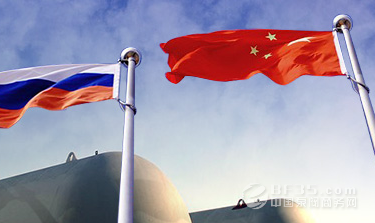


(File photo)
MOSCOW, May 31 (Xinhua) -- Roughly three months ahead of a BRICS summit to be held in China, Russian analysts saw immense potential to increase and diversify economic cooperation between Russia and China.
Vast opportunities can be created during the development of the China-proposed Belt and Road Initiative and the process of Russia's import substitution industrialization, experts said, adding that closer economic ties between the two strategic partners will be mutually beneficial.
They also believe China-Russia trade should be expanded to more non-energy sectors so that bilateral economic cooperation can develop in a sustainable way.
These remarks were made at a time when BRICS countries -- Brazil, Russia, India, China and South Africa -- are busy preparing for the ninth summit of the bloc's leaders on Sept. 3-5 in Xiamen City in east China's Fujian Province.
INFRASTRUCTURE, INDUSTRIAL INVESTMENT
The development of transport facilities is one of the key problems Russia faces, given its vast territory and low quality of roads and railways.
"Chinese investment and joint projects will play a major role in the vast areas of Siberia and the Far East, as well as in other parts of Russia," said Sergei Luzyanin, director of the Far Eastern Studies Institute of the Russian Academy of Sciences.
Luzyanin pinned high hopes on the Belt and Road Initiative, which can "greatly stimulate the development of infrastructure."
To finance infrastructure construction, the BRICS New Development Bank should play a bigger role, said Yaroslav Lissovolik, chief economist of the Eurasian Development Bank.
Russia responded to Western sanctions following its annexation of Crimea in 2014 with a so-called "import substitution" policy in various sectors in a bid to boost domestic industrial production.
The process of import substitution industrialization creates opportunities for Chinese direct investment in Russia, said Vitaly Monkevich, president of the Russian-Asian Union of Industrialists and Entrepreneurs (RAUIE).
"This is beneficial for both sides as Chinese businesses will achieve a higher profit rate and the ability to sell products to China, and Russia will get investment and new jobs," said Monkevich.
According to the Chinese Ministry of Commerce, Chinese companies invested more than 100 million U.S. dollars in Russia between January and April this year.
"We see a serious interest in Russia-China cooperation from business circles of both countries," said Monkevich.
NON-ENERGY SECTOR PARTNERSHIP
Trade between China and Russia jumped 26.2 percent year on year to 24.7 billion dollars in the first four months of 2017, according to China's General Administration of Customs.
In addition to oil and gas, Russian analysts saw the possibility of expanding bilateral trade to more areas.
"RAUIE members often turn to us with requests for export of sunflower oil, honey, ice cream, confectionery and alcohol ... We see a great potential for the development of exports other than raw materials," said Monkevich.
As for space cooperation between Russia and China, Luzyanin expects joint manned space stations and joint space missions in the future.
Furthermore, Luzyanin and Lissovolik, who are also members of the Russian think tank Valdai Discussion Club, suggested Chinese and Russian programmers cooperate in ensuring cybersecurity and developing Internet-based business.
"All this together creates a new quality for the growth of Russia-China cooperation. We can deal with oil and gas and talk about diversifying cooperation at the same time," said Luzyanin.
On Thursday, Russian President Vladimir Putin told visiting Chinese Foreign Minister Wang Yi that both countries should maintain the development of pragmatic cooperation.
Wang echoed Putin's appeal, saying that Russia and China should further deepen cooperation in such fields as trade and investment and explore new sources of economic growth.
 Fire brigade in Shanghai holds group wedding
Fire brigade in Shanghai holds group wedding Tourists enjoy ice sculptures in Datan Town, north China
Tourists enjoy ice sculptures in Datan Town, north China Sunset scenery of Dayan Pagoda in Xi'an
Sunset scenery of Dayan Pagoda in Xi'an Tourists have fun at scenic spot in Nanlong Town, NW China
Tourists have fun at scenic spot in Nanlong Town, NW China Harbin attracts tourists by making best use of ice in winter
Harbin attracts tourists by making best use of ice in winter In pics: FIS Alpine Ski Women's World Cup Slalom
In pics: FIS Alpine Ski Women's World Cup Slalom Black-necked cranes rest at reservoir in Lhunzhub County, Lhasa
Black-necked cranes rest at reservoir in Lhunzhub County, Lhasa China's FAST telescope will be available to foreign scientists in April
China's FAST telescope will be available to foreign scientists in April "She power" plays indispensable role in poverty alleviation
"She power" plays indispensable role in poverty alleviation Top 10 world news events of People's Daily in 2020
Top 10 world news events of People's Daily in 2020 Top 10 China news events of People's Daily in 2020
Top 10 China news events of People's Daily in 2020 Top 10 media buzzwords of 2020
Top 10 media buzzwords of 2020 Year-ender:10 major tourism stories of 2020
Year-ender:10 major tourism stories of 2020 No interference in Venezuelan issues
No interference in Venezuelan issues
 Biz prepares for trade spat
Biz prepares for trade spat
 Broadcasting Continent
Broadcasting Continent Australia wins Chinese CEOs as US loses
Australia wins Chinese CEOs as US loses